
GM/Biotech Crops Report – June 2018
1st June 2018- GM/Biotech Crops Monthly Reports (BELOW) form part of BCPC’s free three-tier Biotech Crops Info service.
- This service also includes a weekly round-up of news from around the globe – see BCPC Newslink GM Crops section.
- Plus – Free access database on over 300 GM/biotech products covering 23 crops in the global market visit BCPC’s GM/Biotech Crops Manual – Register here for free access.
Already registered? Click here
GM/Biotech Crops Monthly Report June 2018
 | Memories and RNA: Where do memories live? A team has apparently transferred learned responses from one snail to another by transferring RNA from one individual to another. Will we soon be able to learn new skills or have new experiences simply by transfer of genetic information? |
|---|---|
| Earth Bio-genome project The United States Department of Agriculture plans to sequence the genomes of 1.5 million species in the next 10 years. They hope that this knowledge will help to identify new solutions to current agricultural problems such as resistance to pesticides. |  |
 | Water-efficient crops? Plants ‘lose’ 98% 0f their water via their stomata and a researcher at Tennessee University is looking at limited transpiration rates in a commercially available variety of cotton. The transpiration stream brings nutrients up from the roots to the leaves so achieving a worth-while water saving without impacting on yield can be difficult. |
| Fewer plant-hoppers on Bt rice Bt rice does not affect plant-hoppers directly but since they prefer plants already damaged by caterpillar activity, they are naturally more common on non-Bt rice plants when given the choice. | 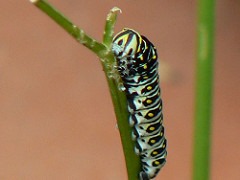 |
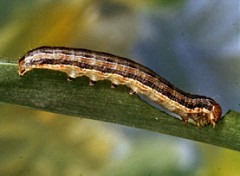 | Surprise benefit of water-efficient maize Maize engineered to be more water-efficient and to be resistant to stem borer attack has shown an unexpected benefit – it also seems to be resistant to attack by fall army worm (Spodoptera frugiperda). This is a serious pest of all South African maize crops and threatens food security, nutrition and livelihoods. |
| Increase in malaria drug yield Artemisinin is the main drug used to treat the 216 million people worldwide infected with the malaria parasite. It is derived from the plant Artemisia annua and now Chinese researchers have achieved a 3-fold increase in the yield of this drug from the plant by simultaneously increasing the activity of three key genes. | 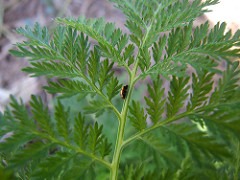 |
 | Finally, a use for Japanese Knotweed Chinese researchers have found that a gene in this pernicious weed confers tolerance of salt stress when spliced into the genome of Arabidopsis. The next step will be to transfer this effect in to more useful plants. |
| Triple-stacked rice yields better Rice lines that carry three improved efficiency genes (for nitrogen use, water use and salinity tolerance) are showing 50% yield increases in field tests. | 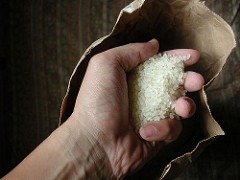 |
 | Improved sunflower yields Field trials of sunflower that has been engineered to be high-yielding and pest-resistant have delighted some Tanzanian farmers. One was quoted as saying that he normally expects to get 6 sacks of sunflowers from an acre but was delighted to get 16 sacks per acre. |
| . |
| Phytophthora rot resistance Phytophthora sojae causes stem and root rot in soybeans but a gene from plant pathogenic bacteria seems to enhance both disease and insect resistance when incorporated into the plant genome. Could it be useful against other Phytophthora species? | . |
 | Imazadolinone-resistant wheat A method of achieving a single specific amino acid change in bread wheat has been discovered by researchers in Australia. The change made confers tolerance to imazamox herbicide and is transmitted to all subsequent generations as growers of home-saved seed will be happy to hear. |
| Blight-resistant potatoes Wageningen University has demonstrated that growing blight-resistant strains of potatoes and only spraying them when high thresholds of disease pressure are reached can reduce fungicide inputs by 90%. Spraying the ‘resistant’ varieties presumably protects the resistance mechanism from breakdown under high disease pressure. | . |
 | Seratonin-deficient rice Serotonin in humans regulates moods and is known to make people happy. It is used in plants to regulate growth and development. When researchers at Newcastle University disables the serotonin production gene in rice that the plants with less serotonin were less attractive to some rice pests such as brown leaf-hoppers and striped stem borers. The serotonin production is diverted to salicylic acid (a close relative of aspirin) so perhaps they didn’t like the taste. |
| Non-browning potatoes Non-browning apples that do not go brown when cut have been available in America for some time now but a team in Brazil have achieved a similar effect in potatoes using CRISPr editing. Under new legislation these would be classed as GE rather than GM potatoes and do not require special approval before being grown as a crop. The report (in Spanish) is available at. | . |
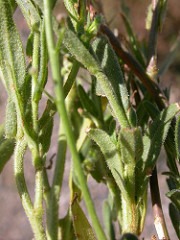 | GM versus GE camelina at Rothamsted Rothamsted has developed lines of camelina that produce oil rich in Omega-3 fatty acids and now a field trial is going to compare 17 GM lines with two produced by GE methods. The benefit of GE is that it does not involve DNA from another species but simply edits the current genome and so does not necessarily require special approval before it can be grown as a crop. |
| Fatter pigs Pig manure is high in nitrogen and phosphate because pigs lack the enzymes required to break down phytase. Now a group in China have spliced the necessary genes from bacteria into the pig genome with the result that pigs grow faster with less nutrient waste in their manure. | . |
 | ALS-herbicide tolerant watermelon Watermelons are grown on wide plant spacing and there is plenty of space for weeds to develop and compete with the crop. China has few herbicides for use in watermelons but using CRISPr editing they have produced lines that are tolerant of ALS herbicides such as sulfonyl ureas. This will improve the ease of controlling weeds in this crop. |
THE LATEST ADDITIONS TO THE GM/BIOTECH DATABASE ARE:
- MON87427 x MON89034 x MIR162 x MON87411- maize with tolerance of glyphosate and resistance to Lepidopteran and Coleopteran insects approved for food, feed and environmental use in Argentina.
- New stacked event: DP305423 x MON89788 – soybean with glyphosate tolerance and modified oil content approved for food use in Japan
- New stacked event: DP305423 x MON87708 – soybean with dicamba tolerance and modified oil content approved for food use in Japan
- New stacked event: DP305423 x MON87708 x MON89788 – soybean with dicamba and glyphosate tolerance and modified oil content approved for food use in Japan.
- Golden Rice – rice with enhanced provitamin A content – now approved for food use in America.
- New transformation event – GHB811 – cotton with tolerance of glyphosate and HTTP inhibiting herbicides such as isoxaflutole.
- MON89034 x TC1507 x NK603 x MIR162 – maize with lepidopteran insect resistance and tolerance of glyphosate and glufosinate approved for food & feed use in South Korea and for food, feed and environmental use in Brazil and Paraguay.
- DAS81419 x DAS44406 – soybean with Lepidopteran insect resistance and tolerance of glyphosate, glufosinate and 2,4-D herbicides approved for food, feed and environment use in Brazil and for food & feed use in South Korea.
- MON87709 x MON89788 x A5547-127 – soybean with tolerance of glyphosate, glufosinate and dicamba approved for food and feed use in South Korea.
FOR INSTANT ACCESS TO GM BIOTECH MANUAL CLICK HERE (Registration required)
Already Registered? Click here to access

